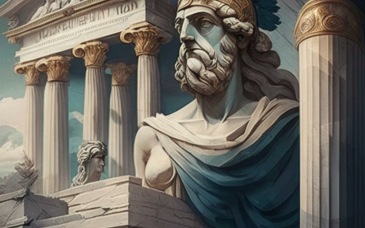Step back in time to ancient Greece, where the heart of Olympia bore witness to a tradition that would echo through the annals of history—the Olympic Games. More than a mere athletic competition, the ancient Olympics were a celebration of physical prowess, cultural unity, and religious devotion.
🏛️ Setting the Stage: Olympia, the Sacred Ground
The Olympic Games were first held in 776 BCE in Olympia, a sanctuary dedicated to Zeus, the king of the Greek gods. This sacred ground became the epicenter of a quadrennial festival that transcended mere sporting events. The ancient Greeks believed the games honored Zeus and forged a sense of unity among the disparate Greek city-states.
🏅 The Birth of Champions: Athletic Excellence in its Purest Form
Competitors, known as Olympians, hailed from various Greek city-states ancient Olympics featured a limited number of competitions, each designed to showcase the participants' strength, skill, and agility. The primary events included foot races, wrestling, boxing, chariot racing, and the pentathlon, a combination of discus throwing, javelin throwing, long jump, running, and wrestling.
⚔️ Spiritual Undertones: Rituals and Ceremonies
The Games weren't just about athletic prowess; they were deeply intertwined with religious rituals. The opening ceremony began with a procession dedicated to Zeus, where athletes, judges, and officials paraded into the stadium. A truce, known as the "Olympic Truce," was declared before the Games, ensuring that athletes and spectators could travel safely to Olympia without fear of conflict.
🎭 Beyond Athletics: Cultural Extravaganza
The ancient Olympics were more than just a sports spectacle; they were a cultural extravaganza. Artists, poets, and philosophers gathered to showcase their talents. It wasn't solely about physical competition; intellectual and artistic achievements were also celebrated. This holistic approach emphasized the Greeks' belief in the harmonious development of both mind and body.
🌐 Global Unity: The Panhellenic Ideal
The Games served as a rare occasion for the often-feuding Greek city-states to put aside their differences and come together in a spirit of friendly competition. The Panhellenic ideal, the notion of Greek unity, was epitomized during the Olympics. Wars and conflicts were temporarily halted to allow safe passage for participants.
🔥 Legacy Beyond Centuries
The ancient Olympics continued for over a millennium, witnessing triumphs, defeats, political changes, and cultural shifts. The Games persisted until 393 CE when the Roman Emperor Theodosius I, considering them pagan rituals, officially banned them.
Today, as we witness the modern Olympic Games, we can trace their roots back to the ancient Olympia, where the flame of competition burned brightly. The ideals of unity, athletic excellence, and cultural celebration continue to resonate, reminding us that, at its core, the Olympic spirit transcends time and borders.
In unraveling the real story of the ancient Olympic Games, we discover a tapestry woven with threads of athleticism, spirituality, culture, and unity—a testament to the enduring power of human endeavors reaching back through the corridors of history.

